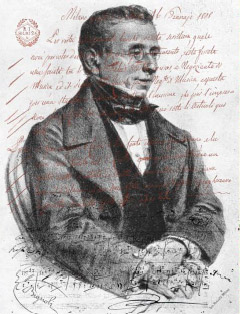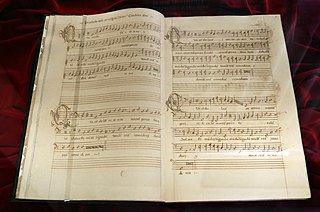Related Research Articles

Gioachino Antonio Rossini was an Italian composer who gained fame for his 39 operas, although he also wrote many songs, some chamber music and piano pieces and some sacred music. He set new standards for both comic and serious opera before retiring from large-scale composition while still in his thirties, at the height of his popularity.

The Messa da Requiem is a musical setting of the Catholic funeral mass (Requiem) for four soloists, double choir and orchestra by Giuseppe Verdi. It was composed in memory of Alessandro Manzoni, whom Verdi admired. The first performance, at the San Marco church in Milan on 22 May 1874, marked the first anniversary of Manzoni's death.

The Symphony No. 6 in F major, Op. 68, also known as the Pastoral Symphony, is a symphony composed by Ludwig van Beethoven and completed in 1808. One of Beethoven's few works containing explicitly programmatic content, the symphony was first performed alongside his fifth symphony in the Theater an der Wien on 22 December 1808 in a four-hour concert.

La gazza ladra is a melodramma or opera semiseria in two acts by Gioachino Rossini, with a libretto by Giovanni Gherardini based on La pie voleuse by Théodore Baudouin d'Aubigny and Louis-Charles Caigniez. The Thieving Magpie is best known for the overture, which is musically notable for its use of snare drums. This memorable section in Rossini's overture evokes the image of the opera's main subject: a devilishly clever, thieving magpie.
The patter song is characterised by a moderately fast to very fast tempo with a rapid succession of rhythmic patterns in which each syllable of text corresponds to one note. It is a staple of comic opera, especially Gilbert and Sullivan, but it has also been used in musical theatre and elsewhere.

Otello is an opera in three acts by Gioachino Rossini to an Italian libretto by Francesco Berio di Salsa after William Shakespeare's play Othello, or The Moor of Venice; it was premiered in Naples, Teatro del Fondo, 4 December 1816.

Casa Ricordi is a publisher of primarily classical music and opera. Its classical repertoire represents one of the important sources in the world through its publishing of the work of the major 19th-century Italian composers such as Gioachino Rossini, Gaetano Donizetti, Vincenzo Bellini, Giuseppe Verdi, and, later in the century, Giacomo Puccini, composers with whom one or another of the Ricordi family came into close contact.

Francesco de Layolle, was an Italian composer and organist of the Renaissance. He was one of the first native Italian composers to write sacred music in the Franco-Flemish polyphonic style, combining it with the indigenous harmonic idioms of the Italian peninsula.
The music of Florence is foundational in the history of Western European music. Music was an important part of the Italian Renaissance. It was in Florence that the Florentine Camerata convened in the mid-16th century and experimented with setting tales of Greek mythology to music and staging the result—in other words, the first operas, setting the wheels in motion not just for the further development of the operatic form, but for later developments of separate "classical" forms such as the symphony.
Il Popolo d'Italia was an Italian newspaper published from 15 November 1914 until 24 July 1943. It was founded by Benito Mussolini as a pro-war newspaper during World War I, and it later became the main newspaper of the Fascist movement in Italy after the war. It published editions every day with the exception of Mondays.

Francesco Corteccia was an Italian composer, organist, and teacher of the Renaissance. Not only was he one of the best known of the early composers of madrigals, and an important native Italian composer during a period of domination by composers from the Low Countries, but he was the most prominent musician in Florence for several decades during the reign of Cosimo I de' Medici.
Domenico Francesco Maria Crivelli, often referred to simply as Signor Crivelli was an Italian born English opera singer and singing teacher.

Armida is an opera in three acts by Italian composer Gioachino Rossini to an Italian libretto by Giovanni Schmidt, based on scenes from Gerusalemme liberata by Torquato Tasso.
Giovanni Mazzuoli was an Italian composer and organist of the late medieval and early Renaissance eras.

Publius Cornelius Tacitus, known simply as Tacitus, was a Roman historian and politician. Tacitus is widely regarded as one of the greatest Roman historians by modern scholars.
Edward Bullough was an English aesthetician and scholar of modern languages, who worked at the University of Cambridge. He did experimental work on the perception of colours, and in his theoretical work introduced the concept of psychical distance: that which "appears to lie between our own self and its affections" in aesthetic experience. In languages, Bullough was a dedicated teacher who published little. He came to concentrate on Italian, and was elected to the Chair of Italian at Cambridge in 1933.

Robert Bruce is an 1846 pastiche opera in three acts, with music by Gioachino Rossini and Louis Niedermeyer to a French-language libretto by Alphonse Royer and Gustave Vaëz. The plot concerns the defeat of the forces of Edward II of England by Robert the Bruce, King of Scots, and is adapted from Walter Scott's History of Scotland. The music was stitched together by Niedermeyer, with the composer's permission, with pieces from La donna del lago, Zelmira, and other Rossini operas. The work was premiered on 30 December 1846, by the Paris Opera at the Salle Le Peletier. The audience may not have noticed, but the orchestra included for the first time a recently invented instrument, which later came to be known as the saxophone.

Anthony D'Accone was an American musicologist. He was the author of documentary studies of the musicians and institutions that produced the music of the Florentine and Siennese Renaissance. His many modern editions of the music of this culture made available to present-day performers and scholars for the first time in several centuries a wide-ranging picture of the musical life in Tuscany during the Renaissance. Musicologist Lewis Lockwood stated that his body of work "substantially extends current knowledge of the music history of the Italian Renaissance."

The American Institute of Musicology (AIM) is a musicological organization that researches, promotes and produces publications on early music. Founded in 1944 by Armen Carapetyan, the AIM's chief objective is the publication of modern editions of medieval, Renaissance and early Baroque compositions and works of music theory. The breadth and quality of publications produced by the AIM constitutes a central contribution to the study, practice and performance of early music.
Edipo a Colono is a piece of incidental music. Gioachino Rossini composed it in 1817 for bass voice, men's chorus and orchestra. The Italian libretto by Giambattista Giusti is based on the eponymous play by Sophocles.
References
- ↑ Frank A. D'Accone, Irene Alm, Alyson McLamore, Colleen Reardon. Música franca: essays in honor of Frank A. D'Accone, Pendragon Press, 1996, pg 283
- ↑ The Cambridge companion to Rossini , Part 7, By Emanuele Senici, Cambridge University Press, 2004, pg. ix